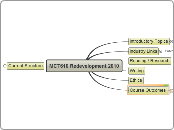realizată de Mary Loftus 15 ani în urmă
400
MCT610 Redevelopment
Graduates of a master's program adhering to GSwE2009 recommendations are expected to achieve proficiency in several critical areas. They will master the Core Body of Knowledge (CBOK)

realizată de Mary Loftus 15 ani în urmă
400

Mai multe ca aceasta
Discussion -
Research - Failure & Ethics
Laws & Theories
Analyse Software Failure - Case Studies
History of SE
Define
Software Quality
Software Project
Software Product vs Process
SWEBOK & SEEK
ID main elements of SE
Software vs Hardware
SE
Summary of Outcomes Graduates of a master‘s program that satisfies GSwE2009 recommendations will:
• Master the CBOK.
• Master software engineering in at least one application domain, such as finance, medical, transportation, or telecommunications, and one application type, such as real-time, embedded, safety-critical, or highly distributed systems. That mastery includes understanding how differences in domain and type manifest themselves in both the software itself and in its engineering, and includes understanding how to learn a new application domain or type.
• Master at least one KA or sub-area from the CBOK to at least the Bloom Synthesis level.
• Be able to make ethical professional decisions and practice ethical professional behavior.
• Understand the relationship between SwE and SE and be able to apply SE principles and practices in the engineering of software.
• Be an effective member of a team, including teams that are international and geographically distributed, effectively communicate both orally and in writing, and lead in one area of project development, such as project management, requirements analysis, architecture, construction, or quality assurance.
• Be able to reconcile conflicting project objectives, finding acceptable compromises within limitations of cost, time, knowledge, existing systems, and organizations.
• Understand and appreciate feasibility analysis, negotiation, and good communications with stakeholders in a typical software development environment, and be able to perform those tasks well; have effective work habits and be a leader.
• Be able to learn new models, techniques, and technologies as they emerge, and appreciate the necessity of such continuing professional development.
• Be able to analyze a current significant software technology, articulate its strengths and weaknesses, compare it to alternative technologies, and specify and promote improvements or extensions to that technology.